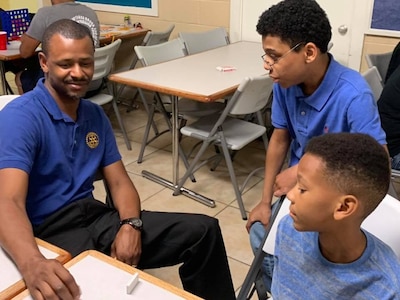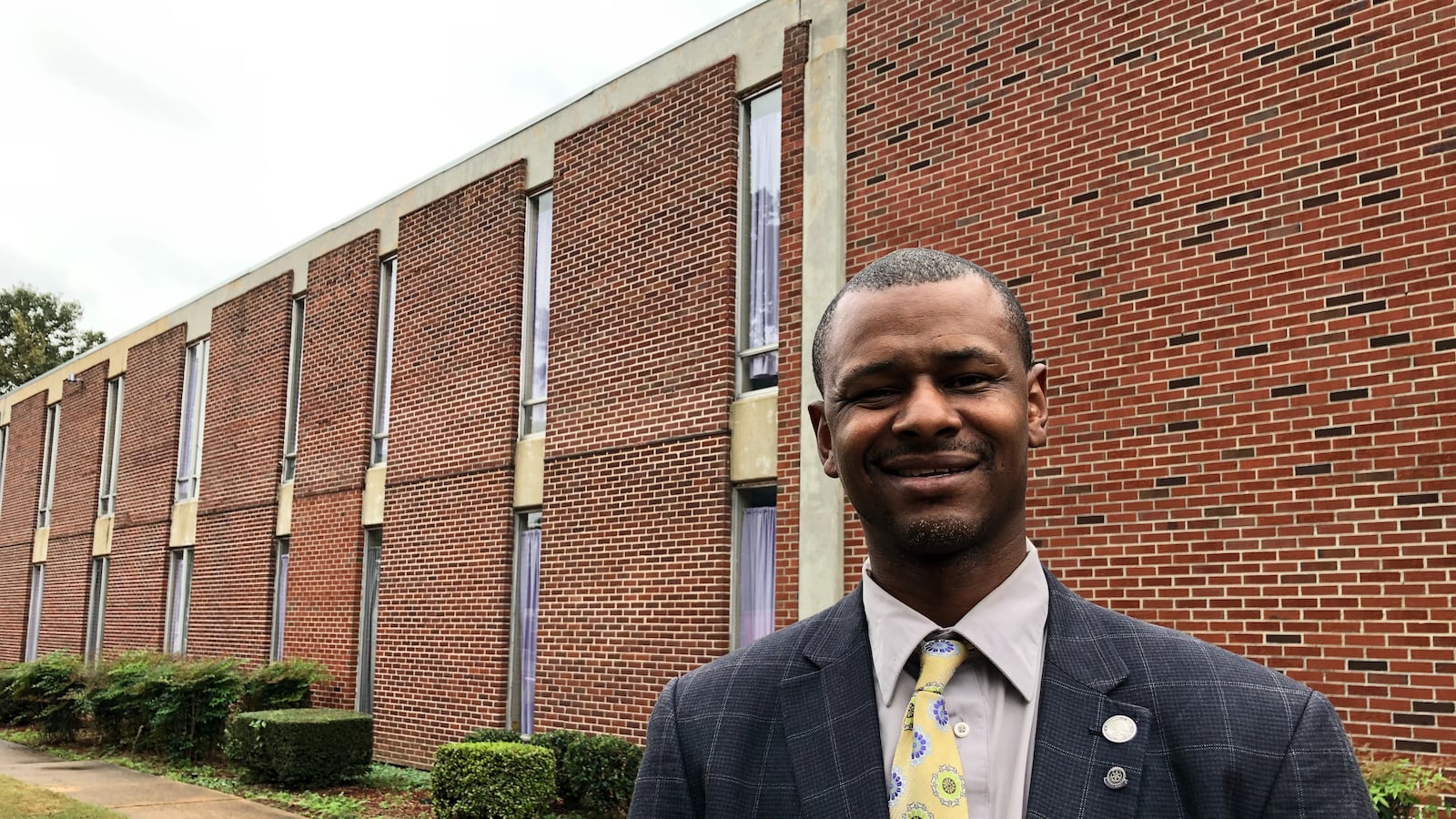Longtime pastor and community activist Charlie Caswell knows there isn’t a silver bullet for improving the lives of students in poverty in Shelby County, but he firmly believes he’s come as close as possible to finding one.
For Caswell, a high school dropout from the Frayser neighborhood in northwest Memphis, learning about childhood trauma changed his life. Studying adverse childhood experiences, or ACEs, gave Caswell the language he needed to process his own childhood wounds. And it empowered him to become an ACEs evangelist, preaching to anyone who will listen — but especially to educators, school district leaders, and even governors — that awareness of childhood trauma can improve the lives of the most vulnerable students.
Caswell worked with Sen. Katrina Robinson, D-Memphis, to craft a bill signed into law this year that asks schools to consider traumatic experiences in students’ lives when determining discipline practices.
He’s trained more than 900 people in the last year on how to identify students dealing with traumatic experiences. Caswell also created Legacy of Legends, a community development corporation that’s partnering with the University of Tennessee and health professionals to work with those students. The group will host its grand opening at a church in Frayser later this month. Legacy of Legends is currently working with 30 students, and Caswell hopes to reach 100 students this year.
Childhood trauma negatively affects a child’s ability to learn. Researchers have tied stressful events such as divorces, deportations, neglect, sexual abuse, and gun violence to behavioral problems, lower math and reading scores, and poor health. This research is especially relevant in Memphis, where childhood poverty is on the rise and gun violence is prevalent.
Chalkbeat spoke with Caswell about his childhood, forming Legacy of Legends, and why he hopes every person in Memphis undergoes training on adverse childhood experiences. This interview has been lightly condensed and edited for clarity.
What was your education experience like growing up in Memphis? How does your childhood influence the work you do today?
I grew up in housing projects and went to Carnes Elementary School, which is closed now. Actually, my elementary school and high school both are closed, and my middle school was taken over by the state. I went to Humes when it was a junior high school, but unfortunately, I had some incidents there where I was kicked out.
In ninth grade, a fight happened at the school with my friends. I didn’t fight, but I was rounded up in the group and sent to juvenile court. I was locked up when I was 15. I saw my old principal again for the first time when I was doing a district training a few months ago. I always say that we have to be willing to ask “what happened to the children?” not “what’s wrong with these children?” If someone had asked me what had happened, maybe I wouldn’t have gone to jail. Now that experience really helps me to deal with how you can be a good child in a bad place and at the wrong time. It helps me to relate to kids who are talked about as being “bad” when I know bad things might have happened to them, but they aren’t bad.
I went to Northside [High School], and coming from a community of drugs and feeling like my teachers didn’t care, I felt like I was wasting my time. I actually paid some of my teachers to let others write my papers for me — that’s how little they cared and I tried. I dropped out. I thought that I might either be dead or in jail in this community anyway, so why put forth a real effort.
How did you go from that 18-year-old who believed he’d die or end up in jail to the person you are today? How did you become passionate about addressing issues of childhood trauma?
Just like the things in my childhood that broke me, there were pieces that built me up and gave me hope. There was a gentleman named Toney Armstrong who was our former police director, but back when I was a kid he dated my sister when he was a rookie cop. When Toney became a cop, one of the arrests he made was on my brother, and he told me, “Chuck, you’re not going to be like your brother.” And he looked out for me; he’d come play ball with us. The Boys & Girls Club used to bring a bus to the neighborhood to pick up kids for games, and when he heard that I wasn’t on the bus, he’d ask the director to come get me. It was that — it was people coming back for me that now reminds me that I have to go back for the least of these.

But when I really changed was after seeing my older brother, who I thought was the man, get sentenced to 10 years in jail. Then a friend of mine shot another friend. And I watched another friend get shot in the head a year later. I just decided I didn’t want to die, you know? I got a job at a car lot. I started doing car washes out of the trunk of my car when I was 17 years old. I ended up becoming the manager of a car lot, then the finance manager, then took over the dealership. I became a pastor. I started reading everything I could on childhood trauma, on ACEs, and it all started clicking. I realized how my whole life had been influenced, had been colored, by what happened to me early on. And while that wasn’t the end of me, I knew I needed to get my own residual anger in check. And I really needed to help others with understanding their own trauma and fighting against its effects in their own lives.
How are you taking what you’ve learned into Memphis schools and the broader community?
There’s a program we’re doing called Wraparound Frayser that focuses on providing assessments to determine trauma or ACEs that a child may have experienced and then provides high-fidelity wraparound services and work with my team and that family to surround that child, right? We have five people on staff now. We partner with Ascent Health to do therapy sessions. We’re also partnering with FACES for a community engagement specialist. The model we’re doing now is a pilot to show that a community-based organization can partner with clinical-based companies and build a high-fidelity wraparound model.
Schools refer students to us, churches can refer to us. Parents have started coming to us directly. When a child is referred to us, we first do an ACE assessment with the child and parent, and then a resilience assessment. The resilience assessment goes even deeper with questions like, “Do you feel like your mama or daddy was there for you?” “Did someone in your family care about how you were doing in school?” The reason we have both the child and the parent do this is because oftentimes parents themselves also have had traumatic experiences that they’ve never dealt with. How can their child work on this if the parent has never dealt with their own challenges?
Then, with the family and children, we make a set of goals that we work on with them. We have another grant that’s going to allow us to expand this work beyond the neighborhood of Frayser. We’re going to work with 100 kids this year, and hopefully 400 kids in the future across Shelby County. It’s a movement, right?
In addition to the one-on-one work with students and families, you’ve also been focused on training to raise awareness of ACEs among adults. Tell me more about that.
I’ve done trainings with police and politicians on how trauma impacts our young children. I just went through a two-day training with Shelby County Schools Board Commissioner Stephanie Love on how brain development is impacted by traumatic experiences. Now Ms. Love is trained to facilitate that same program and she’s focused on trying to train more parents and the district. She’s a board member equipped with this now, right? That’s the type of influence we want.
But within the schools, it has been hard to help teachers go from their head knowledge to heart knowledge, if you will. They know with their head that their students are going through a lot, but that doesn’t impact how they view discipline. For example, after I did a training at a school I had a principal come talk to me because her teachers were still coming to ask to send children home because they said they were “off the chain.” Send them home to what is traumatizing them? That’s not going to help what we need to be doing. But it also can’t be fair to put that on this teacher, who has 29 other students who need her to teach and she can’t teach with this child in her class right now. So, instead of sending that child home or putting them in the hallway, we need wraparound services. We need someone to call to come work with that child and get them to a place where they can get back to learning that day, and also work on their long-term health.
There’s a tension I feel and hear when talking to some educators that parents need to be more involved in their children’s lives, and that will make their behavior better. And then when I talk to parents, they feel that schools aren’t doing enough for their child. What do you think about this tension?
The parent is right, and so is the teacher. Yes, it is the parents’ responsibility for the behavior of their child. But many of the parents who you are asking to step up, when you dig to the root of their lives, you’re going to see the discrimination, you’re going to see the poverty and the systems that were created intentionally that held people back. It’s not just as easy to pull yourself up and help your family. And some parents are trying incredibly hard and working multiple jobs, trying to secure a more stable home, more stable transportation for their kids. Again, the teacher has 30 children to educate and can’t be expected to be a teacher and a counselor. What I’m saying is that it’s not a good plan to keep blaming someone else to step up. I’m saying that we as the community have to step up for our children.
It’s hard to be innovative; it’s hard to do something different when you don’t have the money. When you look at a place like my old high school, Northside, where we knew the poverty level is high. We knew the crime level is high, but yet we still allow these children to go to a school that’s got 30 kids to one teacher, and now that teacher has to come deal with all of that trauma herself? Can’t we do better than that as a community? As a state? We can figure out new ways to fund this trauma-informed, trauma-responsive work. That’s my life’s work now.

This article tackles a topic raised during our 2019 Listening Tour. Read more about the 2019 Listening Tour here, and see more stories inspired by community input here.

